Throughout the eCommerce customer journey, from product discovery to post-purchase support, there are many opportunities for revenue loss. While product managers might be aware of where these leaks occur and that chatbots offer potential solutions, choosing the right provider requires a thorough analysis to find the best fit.
The best eCommerce AI chatbot platforms balance functionality with integration capabilities and the ability to scale with traffic volumes. They enable custom workflows, provide quick and personalized responses, and smooth out points of friction.
In this article, we'll cover the top AI chatbots for eCommerce, along with their benefits, examples, and the top features to consider while exploring your options.
What Are AI Chatbots for eCommerce?
AI chatbots for eCommerce are virtual assistants that enhance customer experience or provide support in an online shopping environment.
Unlike traditional rule-based chatbots, they utilize intelligent features such as natural language processing (NLP) models and large language models (LLMs) to understand buyer intent. This means they can:
-
Answer questions
-
Guide purchasing decisions
-
Provide customer support
The introduction of AI chatbots in this setting is driving the rise of conversational commerce, where customers engage with brands' AI assistants across multiple channels, including websites and social media apps.
With 65% of companies already regularly using AI in 2024 and cart abandonment rates reaching 70.19% on average in the same year, eCommerce chatbots are becoming critical to driving and retaining revenue.
Top AI Chatbots for eCommerce Platforms
Storefront Chatbots
| Ada | Low-code AI chatbots for order tracking and returns |
|---|---|
| Zowie | Automates repetitive customer queries |
| Gorgias | Storefront chatbot to handle refunds and order tracking |
| Certainly | AI shopping assistants to guide product discovery |
Customer Experience/Support
| Tidio | No-code chatbots for FAQs & support volume |
|---|---|
| Netomi | Chatbot support for compliance-heavy industries |
| LivePerson | Easy AI-to-human chat handoffs across channels |
Developer and Marketing-Focused
| Stream | Customizable chatbot and voice agent integrations |
|---|---|
| ManyChat | Bots for engagement, sales flows, and cart recovery |
Ada
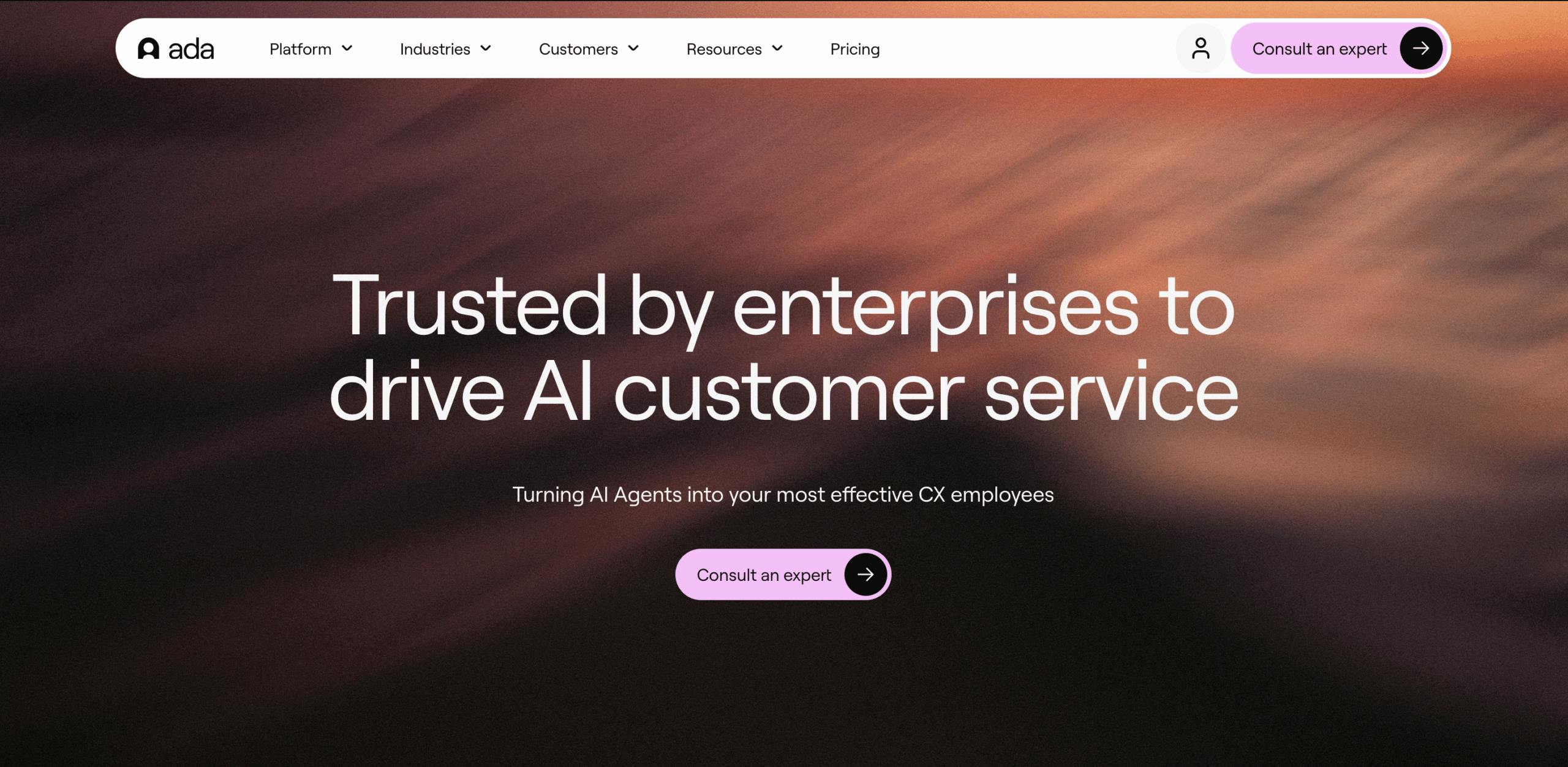
Ada uses LLMs to automate interactions with customers. This allows for more contextual, scalable support at each stage throughout the customer journey. The platform is also heavily focused on compliance with GDPR, SOC 2, and HIPAA certifications, and a privacy-by-design approach.
Highlights:
-
NLU for highly contextualized responses
-
Out-of-the-box support for 50+ languages
-
Sandboxing to test AI bot conversational capabilities before deployment
Best For:
-
Multilingual customer support
-
Maintaining support levels during spikes
Key Differentiators: Since Ada is low-code, product managers and CX teams can easily build and adjust chatbot flows without leaning on technical resources.
Zowie
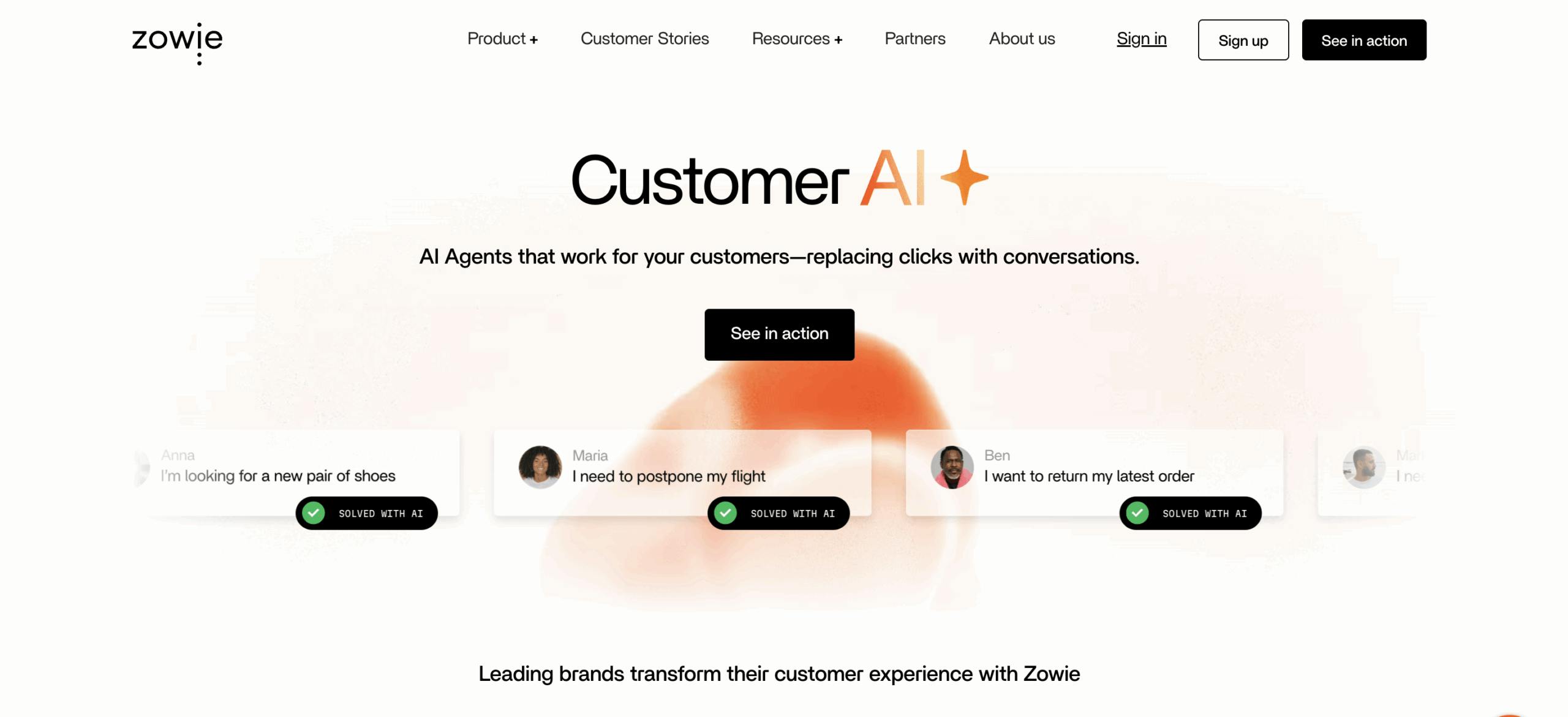
Zowie helps automate workflows for customer support teams and scale customer interactions. It primarily focuses on reducing the volume of repetitive support queries.
Highlights:
-
Pre-built flows for order status and returns
-
Proprietary layers for accuracy controls
-
Real-time escalation flows
-
Built-in analytics
Best For:
-
High volumes of support inquiries
-
Order system and inventory tracking
Key Differentiators: Zowie primarily serves eCommerce businesses in the EMEA region, with out-of-the-box support for over 100 languages.
Gorgias
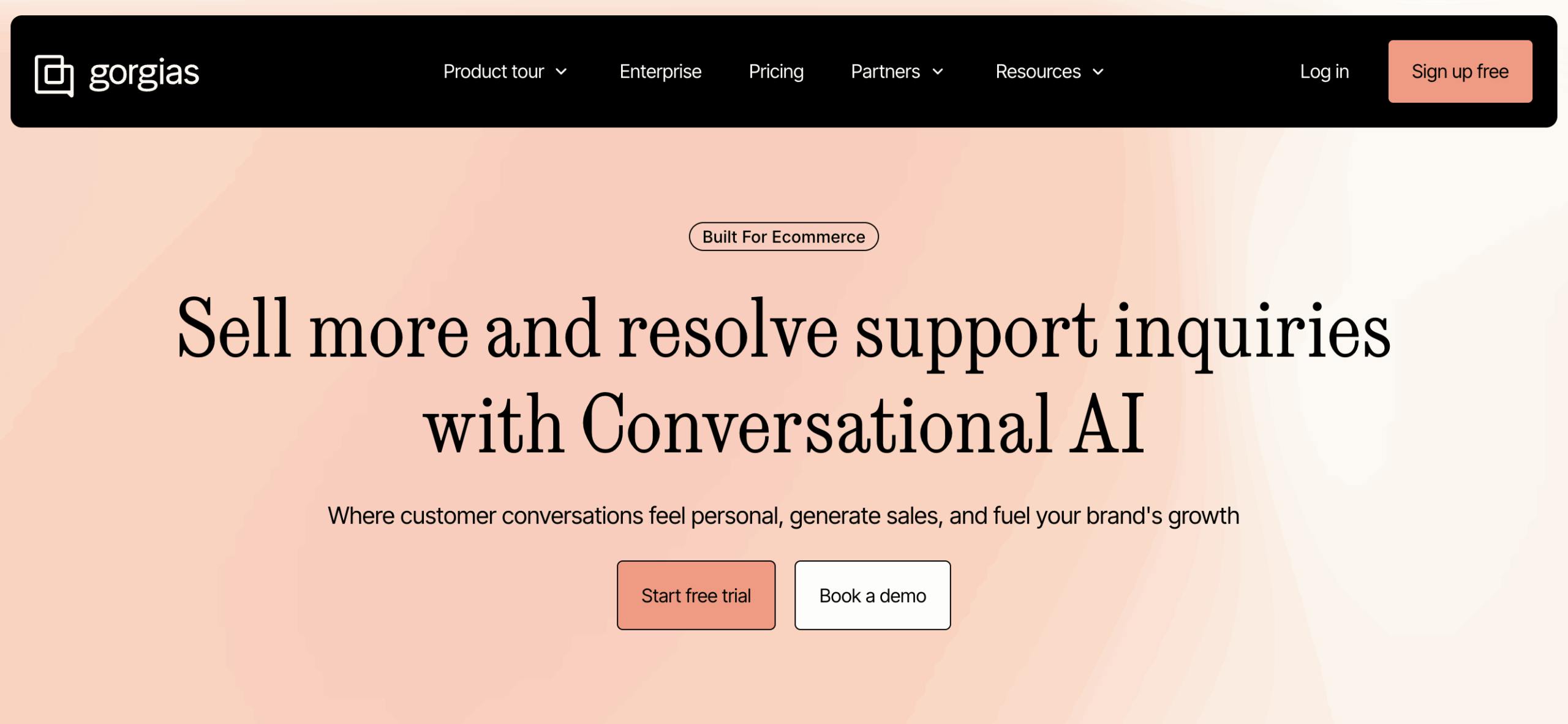
Gorgias powers automated chat interactions and is the top-rated helpdesk on the Shopify app store. The chatbot integrates directly with storefront platforms to pull live order data into conversations and trigger actions on the order within the chat.
Highlights:
-
Agents for FAQs, order tracking, and returns
-
Single inbox for conversations across all channels
-
Basic intent detection
Best For:
- DTC brands using Shopify
Key Differentiators: Gorgias pulls multiple channels, including live chat, email, SMS, and social media direct messages into one interface, so bots and human agents can handle refunds, discounts, and order tracking without switching systems.
Certainly
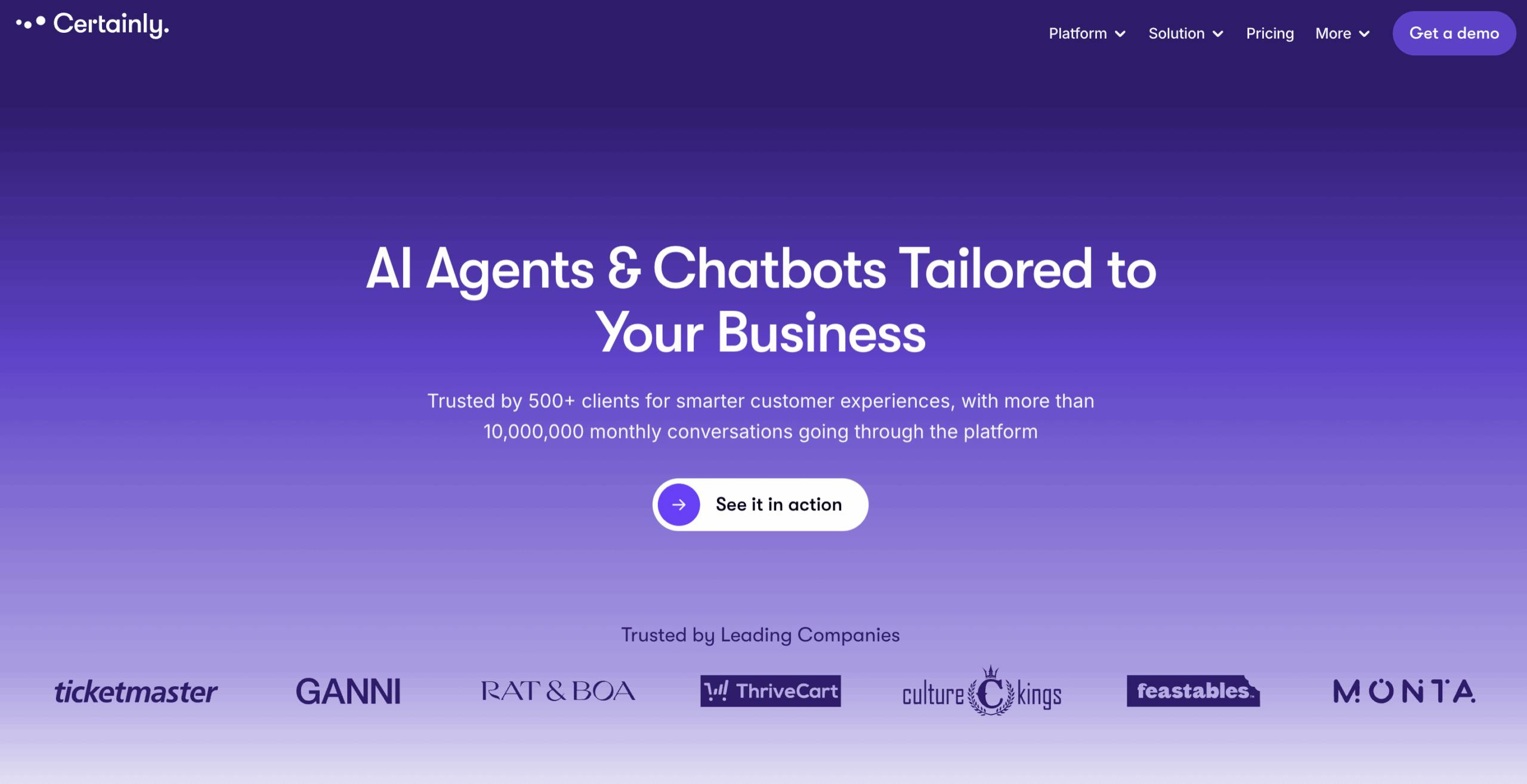
With a combination of no-code tools for set-up and developer API integrations, Certainly speeds up time to market for AI chatbots while allowing advanced customization.
Highlights:
-
Chat-based, personalized product suggestions linked to catalog knowledge base
-
In-chat checkout
-
Proactive and automated cart recovery prompts
Best For:
- Reducing cart abandonment rates
Key Differentiators: Certainly is purpose-built for online retailers, so its out-of-the-box capabilities focus specifically on improving conversion rates throughout the customer journey.
Tidio
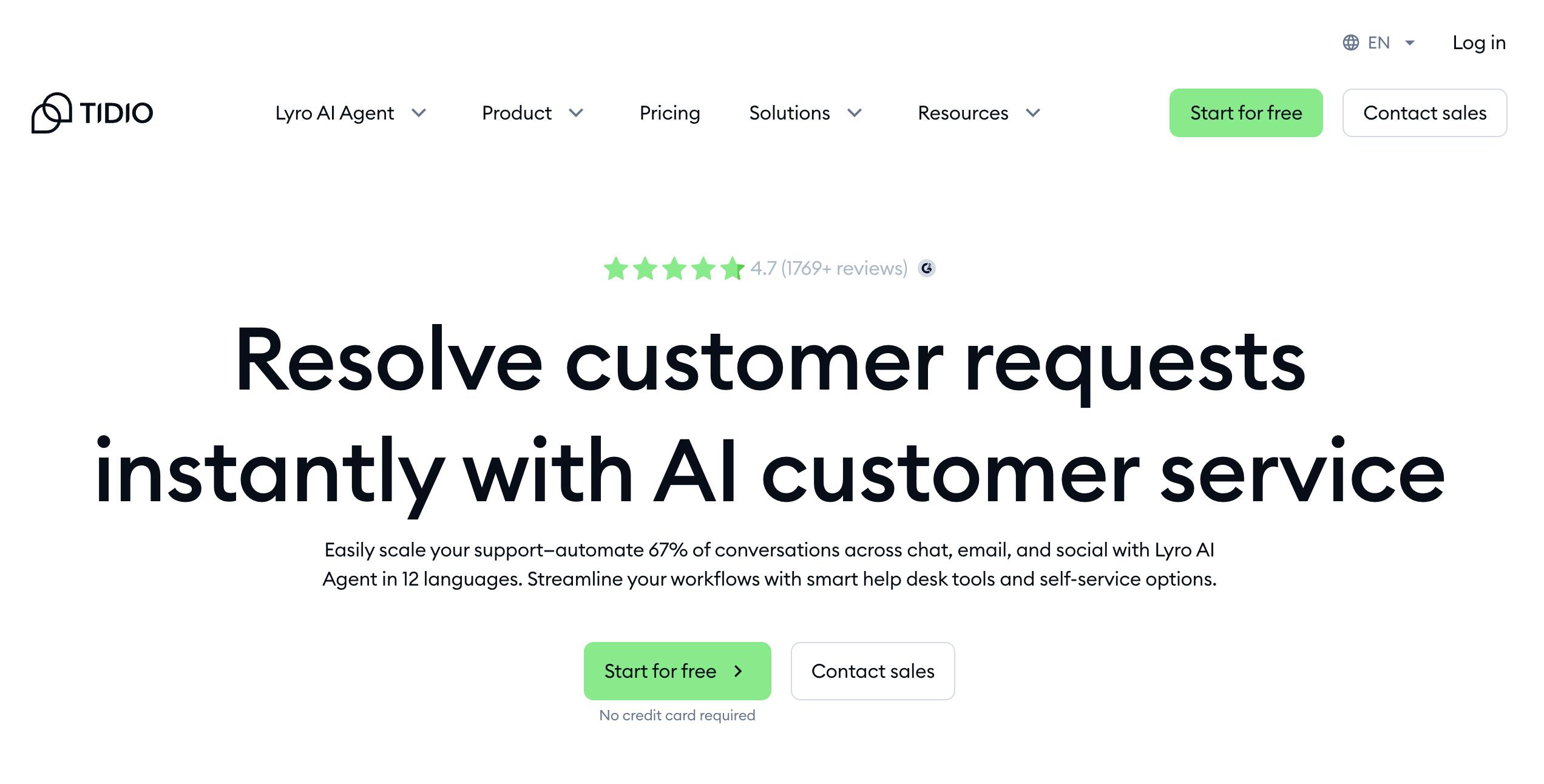
Tidio is an all-in-one, no-code AI chatbot platform for small to medium-sized eCommerce companies to facilitate live chat.
Highlights:
-
Ability to train the chatbot using existing FAQs
-
Visual editor for building conversational flows
-
Single inbox for conversations across multiple channels
-
Proactive messaging based on user behavior
Best For:
- eCommerce teams with minimal engineering support
Key Differentiators: Although it has powerful automation features, Tidio requires no engineering intervention. This makes it ideal for lean teams who focus more on speed to market and functionality, rather than customization.
Netomi
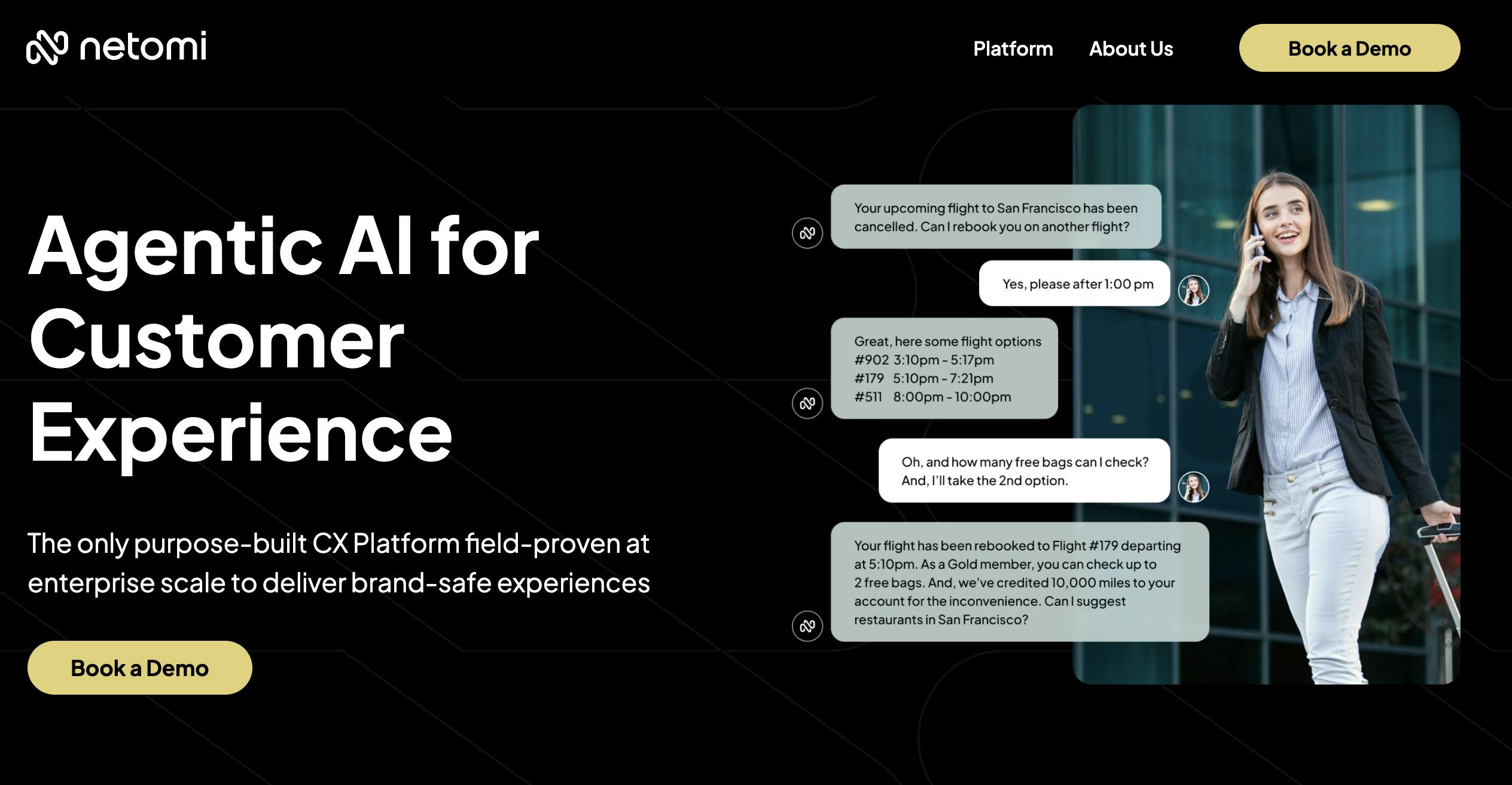
Netomi is an AI-powered customer experience platform that provides a no-code studio for customer support teams to deploy AI chatbots quickly. It supports both chat-based interactions and email inquiries.
Highlights:
-
LLM-powered responses trained on customer data and brand guidelines
-
Co-pilot mode for human agents to review and edit messages
-
Autopilot mode for end-to-end automation
Best For:
-
Scalable AI-powered customer support
-
Regulated industries with high levels of AI governance
Key Differentiators: Netomi's features mean brands can enforce strict controls on their "sanctioned" AI chatbot based on brand guidelines and regulatory compliance.
LivePerson
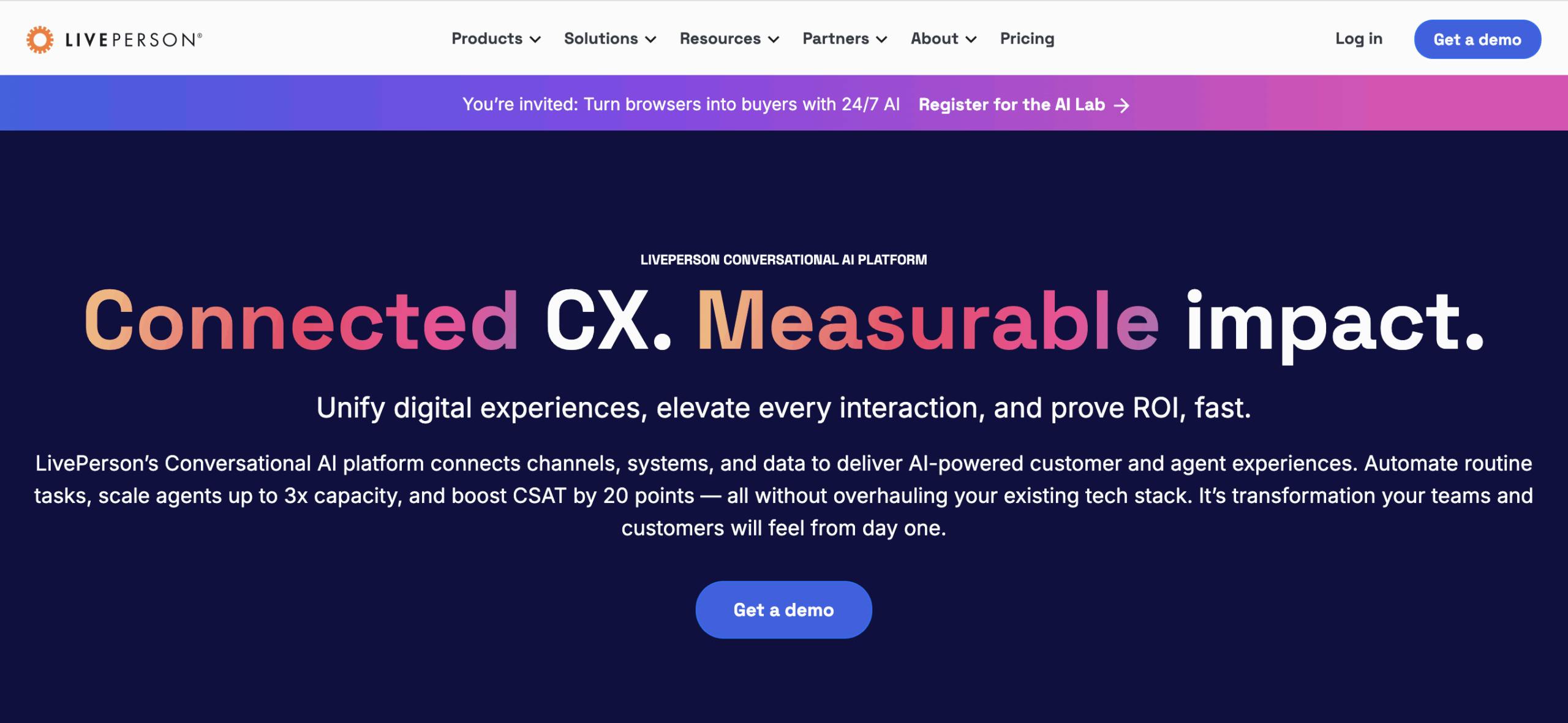
LivePerson is a conversational AI platform for both voice and text interactions. It combines automation and real-time routing to human agents to power customer conversations.
Highlights:
-
No-code conversational chatbot builder with structured workflows
-
Built-in tools to detect intent and personalize responses
-
Omnichannel messaging across web, SMS, WhatsApp, and more
-
Real-time analytics on automation rates and intent coverage
Best For:
- Businesses with complex support operations that require chatbots to handle routine queries while also quickly detecting and escalating exceptions
Key Differentiators: LivePerson provides enterprise-grade controls, including a serverless logic layer that enables teams to set detailed rules for how and when conversations should be fully automated, rerouted, or escalated to human agents.
Stream
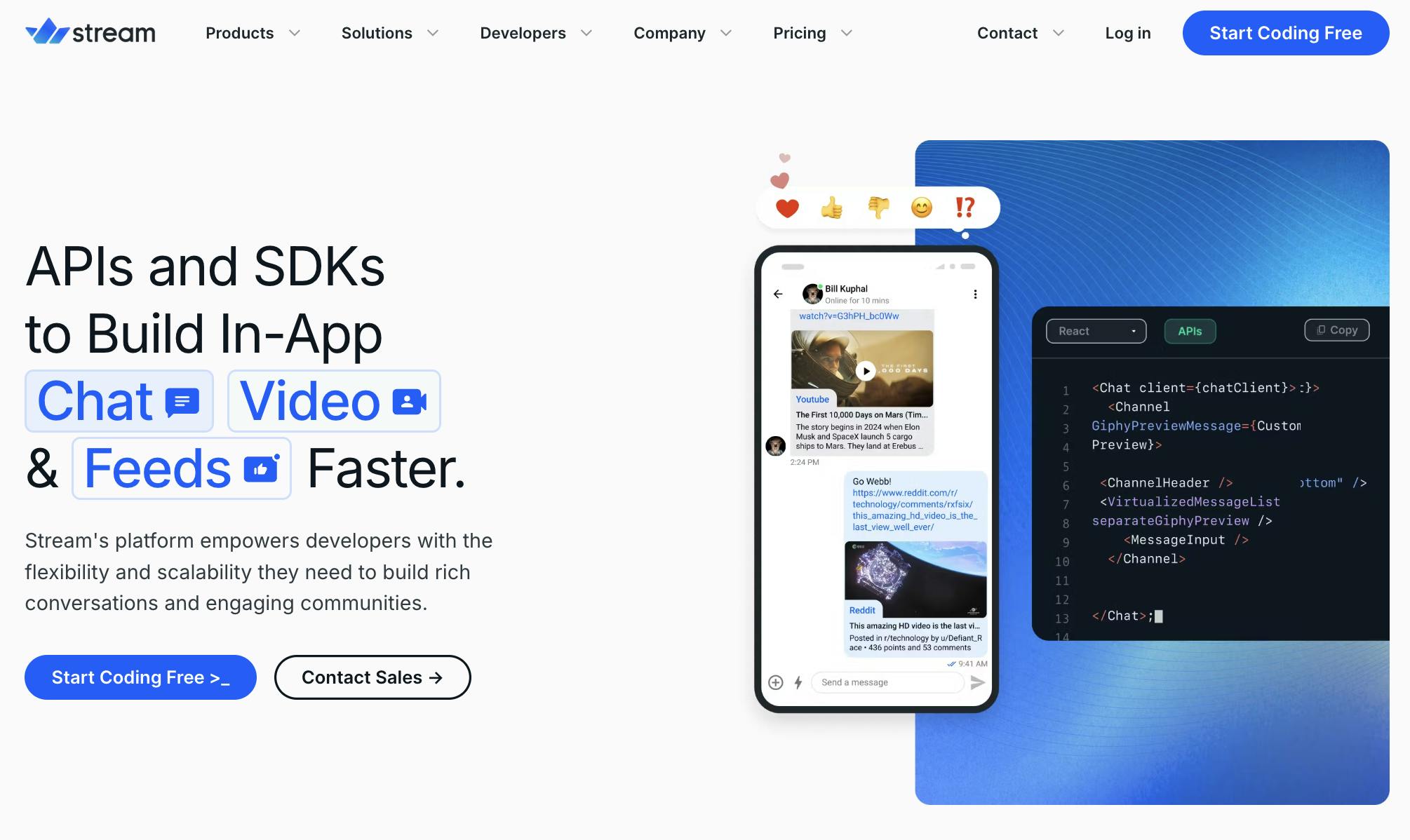
Stream's developer-friendly APIs let teams quickly embed real-time voice, chat, and video features into their apps without all the infrastructure and engineering. AI-powered chatbots and voice agents are available as integrations/add-ons through Stream's chat and video/voice APIs/SDKs, respectively.
Highlights:
-
Framework support for React, Flutter, Swift, Kotlin, and more
-
Pre-built and customizable UI components, including thinking indicators, animations, code support, and more
-
Scalable global edge network to reduce latency and ensure consistent performance
Best For:
-
Voice and text use cases
-
In-app support with no third-party UI limitations
-
Scalable support for mobile and web apps
Key Differentiators: Pre-built AI chatbot platforms typically limit customization in design and workflows. With Stream's SDKs and APIs, you get full control over the conversational experience without spending weeks building in-house and debugging core functionalities.
Manychat

Manychat automates interactions specifically on social media and messaging channels. It supports eCommerce brands in growing audiences and driving conversions with campaign-style chat flows.
Highlights:
-
Drag-and-drop conversational flow builder
-
Natural language parsing for handling lightweight FAQs
-
Integration with Instagram, Messenger, WhatsApp, and SMS
-
Marketing campaign deployment and drip sequences
Best For:
- Small and medium-sized eCommerce teams relying on or driving social commerce and influencer-driven sales
Key Differentiators: Rather than customer support, ManyChat's AI features support sales and marketing efforts by running conversational campaigns to drive revenue and increase customer lifetime value.
Examples of AI Chatbots
Alibaba's AliMe Chatbot Resolves 75% of Customer Queries
Alibaba Group, China's largest eCommerce company, serves nearly 1 billion customers. Its marketplace handles hundreds of millions of transactions and millions of customer queries daily.
Alibaba's AI chatbot, AliMe, manages 75% of customer inquiries, boosting satisfaction by 25%. Thanks to deep integration with order and logistics systems, AliMe can also independently handle delivery updates and process returns.
Vodafone's Gen AI Assistant Handles Over Half of Customer Service Queries
Vodafone's chatbot and generative AI assistant, SuperTOBi, handles more than half of the company's first-contact customer service queries.
SuperTOBi streamlines customer interaction workflows, handling everything from billing issues to technical support. For eCommerce, it automates online plan change requests, which boosts revenue and lessens the workload for human agents.
Amarra Leverages ChatGPT to Reduce Overstock
Amarra, a New Jersey-based fashion wholesaler, used OpenAI's ChatGPT to generate product descriptions and manage inventory content, ultimately reducing overstock by 40%.
On the support side, Amarra's chatbot now handles nearly three-quarters of all customer queries, improving operational efficiency and customer satisfaction.
Top Use Cases
Product Recommendations
These bots use customer browsing habits, sentiment analysis, and inferred intent to guide product discovery and personalize recommendations.
Acting like personal shoppers in real time, the bots can surface new products and use responses to tailor product recommendations for advanced personalization. Where static, rule-based chatbots have limitations here, AI bots use advanced NLP models to engage in back-and-forth conversations with customers to get additional context or clarification.
This helps reduce friction between product discovery and "add to cart" actions to drive higher order numbers and higher average cart values.
Customer Support
Traditional chatbots have been in place to assist with customer support queries for a long time. They can use rule-based workflows to answer basic queries on order tracking and return policies.
Customer service chatbots with AI, however, can respond dynamically and interpret intent for more personalized and empathetic responses to support queries. Workflows can pinpoint when complex queries require escalation to a human agent to maintain low friction levels for customers.
Engagement and Retention
Abandoned carts and repeat customers are critical areas for eCommerce teams. Automation with AI-powered bots helps to reduce cart abandonment and send post-purchase check-ins and marketing campaigns at optimal times to encourage repeat store visits.
Teams can train their chatbots to handle customer objections, for example, or offer incentives based on website visitor behavior triggers. These kinds of conversation-based customer loyalty efforts, especially when automated at scale, can significantly boost conversion rates and customer lifetime values.
Promotional Messaging
Reducing cart abandonments minimizes revenue left on the table. But AI chatbots in eCommerce can also use context to effectively drive upsells and cross-sells to increase overall cart value. It's a step up from batch email campaigns based on cart contents because the bots can trigger this messaging at precisely the right time in the user journey.
Benefits of Using Chatbots in eCommerce
Scalability
When traffic spikes, AI chatbots can scale support without significant staffing increases to keep pace with higher volumes. This is especially helpful when seasonal spikes in eCommerce lead to large fluctuations in support queries.
Operating Efficiency
High-frequency tasks can represent the largest portions of eCommerce support queries, whether it's order tracking or inventory questions. With AI chatbots handling the majority of the support load, it reduces staffing overhead and gives human agents more time to focus on bigger things.
Faster responses across all queries, whether chatbots or humans are handling them, lead to higher customer satisfaction and brand trust.
24/7 Global Coverage
Full-time human support requires higher staffing levels and costs when a brand delivers across multiple regions. For global brands, this can add an ever-higher level of cost and complexity if they need international support teams. These chatbots provide 24/7 coverage, often with multilingual support, so the brand can rely on automation rather than fully staffed human teams.
Detailed Analytics
eCommerce platforms with advanced chatbot capabilities provide detailed insights so product and customer success teams can:
-
Surface gaps in coverage
-
Analyze and improve conversation and escalation flows
-
Identify conversation drop-off points
Top eCommerce Chatbot Features to Keep in Mind
Scalability and Performance
Scalability involves more than just managing traffic and conversation surges. The AI chatbot must also perform consistently under these heavier loads. Otherwise, the system might slow down or crash during peak times, leading to abandoned carts and lost revenue.
This means evaluating potential vendors based on infrastructure support and latency benchmarks, for example. These metrics impact bottom-line results, like cart recovery and customer conversions, so poor performance can have significant consequences.
Personalization Capabilities
Personalization is only useful if the AI chatbot recommends genuinely useful and appropriate products to your customers. If the recommendations don't reflect real-time user behaviors or established preferences, they can put customers off and increase abandonment rates.
Salesforce's State of the Connected Customer Report revealed that only 38% of consumers are comfortable with an AI agent making personalized recommendations, so the "wrong" AI recommendations can further erode trust.
Natural Language Understanding (NLU)
NLU is what separates a conversational AI assistant from rigid bots to give interactions a more human quality. Check with potential vendors whether their models can handle phrasing variations and how they train them to interpret intent.
Conclusion
The right ecommerce AI chatbot tool boosts product outcomes rather than creating operational friction. It should integrate with your existing stack and enable the level of customization you need to improve user experiences.
Your chatbot implementation should also aim to reproduce human interaction as closely as possible, so conversations feel natural. In combination with automation and customization, this positions chatbots as revenue enablers for every stage of the eCommerce buying journey.

